- Treatments
- Venus Versa Treatments
- Photorejuvenation Treatment
Photorejuvenation with the Venus Versa
Like the rest of the body, the skin of the face, neck, and the delicate area of the décolletage (the skin on the upper part of the chest) go through changes as we age.
However, unlike the rest of the skin on the body, these areas are more fragile and also more exposed to the elements as well as to pollution in the air and pore-clogging cosmetic products.
In addition to the effects of gravity, which can cause sagging, drooping and deep creases associated with facial ageing, in almost all skin types, ultraviolet (UV) exposure will cause concentrated areas of increased melanin production known as age spots, which are especially common in people over 50, but can occur in younger people as a result of sun exposure. UV exposure can also cause vascular marks, which are distended blood vessels, such as spider veins. These marks of discolouration can be especially prominent in people with lighter skin tones, however they can affect people of all skin tones.
Photorejuvenation is an advanced skin treatment that uses Intense Pulsed Light (IPL) to treat spots of discolouration, and it can also remove wrinkles, and treat uneven texture in the skin.
Intense Pulsed Light with SmartPulse technology penetrates through to the skins deeper layers to repair and rejuvenate from the inside out. This process reverses the signs of photoaging (meaning the ageing effects of UV light) by removing the appearance of damage.
While discolouration is a normal part of the facial ageing process that happens to us all, some people find that for one reason or another, age-related marks on the skin of the face negatively impact their self-confidence.
This might be because the discoloured marks make them appear older than they feel on the inside; or there may be other issues that negatively affect them – for example, they might feel passed over in business settings, as they compete for jobs with younger colleagues; or feel as though the appearance of discolouration (and other signs of facial ageing) limit their options socially.
The changes that cause facial ageing can be accelerated by other factors – some of them we might have no control over, like genetics; and some which are as a result of lifestyle choices, such as overexposure to the sun’s harmful ultraviolet (UV) rays, drinking alcohol, smoking, or using vaping devices.
Although representations in the media may make it seem that concerns about facial ageing are superficial, stem from vanity, and only affect women, this couldn’t be further from the truth. Both men and women can be negatively impacted by the appearing older than they feel, and the effects can be far-reaching, interfering with their daily lives in more ways than simply when they’re looking in the mirror.
At Derma, we offer the gold standard of dermatological treatment – meaning every treatment we provide is state-of-the-art and backed by scientific evidence. This is why we’ve chosen to offer treatment with the Venus Versa – the very best in cutting edge advanced photorejuvenation technology.
While the effects of advanced photorejuvenation treatment can have a significant positive impact on a person’s self-confidence, it is not suitable for everyone. This is why before undergoing any treatment, it is essential to first have a consultation with a specialist dermatology nurse, whose expertise in the medical treatment of the skin can best determine whether it will be suitable and effective, and who can oversee the administration of treatment for the best outcomes, and who can identify how many sessions you will likely need in order to attain the desired outcome.
What is the Benefit of Photorejuvenation with the Venus Versa?
Photorejuvenation with the Venus Versa is performed by highly-trained practitioners overseen by dermatologists, so you can rest assured that your treatment is being delivered by the safest hands.
Advanced photorejuvenation treatment can help to improve self-confidence, while removing marks on the skin and restoring a smoother, more rejuvenated appearance of even texture to the skin.
In contrast to cosmetic creams and beauty treatments that usually focus on camouflaging the superficial layers of the skin to make issues appear less prominent for a few hours or days; advanced photorejuvenation treatment with the Venus Versa directly targets the problem, and is far more effective at resolving it longer-term, especially if a patient chooses to make lifestyle changes, and undergoes maintenance treatments down the line.
Photorejuvenation with the Venus Versa is safe on patients of all skin tones, which sets it apart from almost every other medical device in the market.
Treatments have minimal downtime and can often be performed in as little as 15-20 minutes, depending on the area being treated. An appointment can often be carried out during a lunch break, or an afternoon off.
While multiple sessions are typically needed to obtain the final results, and the number of sessions depend on the individual patient (usually 4-5) - once they are achieved, the effects of advanced photorejuvenation treatment can be quite long-lasting, so long as patients follow the aftercare instructions, and do not carry on with lifestyle habits that will counteract the effects of the treatment (for example, UV exposure will continue to accelerate facial ageing even after treatment; people who consume a lot of alcohol might see spider veins slowly return).
Some people will need to undergo maintenance therapy down the line to retain the effects of the treatment.
In the longer term, if it is desired, advanced photorejuvenation treatment can also be combined with other treatments, such as anti-wrinkle injections or dermal fillers, however they cannot be performed at the same time; and any injectable aesthetic treatment must have appropriately settled before photorejuvenation would be suitable. You can discuss this confidentially in consultation so that you can plan ahead.
Some people will need to undergo maintenance therapy down the line to retain the effects of the treatment.
Who is Photorejuvenation with the Venus Versa Suitable For?
Photorejuvenation is safe for use on all skin tones, but the results may be more apparent on individuals with light to medium skin tones.
Patients wishing to treat areas of discolouration or spider veins, and who may also have skin that is showing a loss of elasticity, sagging or fine lines would be potential candidates, however not all patients are medically suitable for treatment; or they may have to wait before they can safely undergo the procedure.
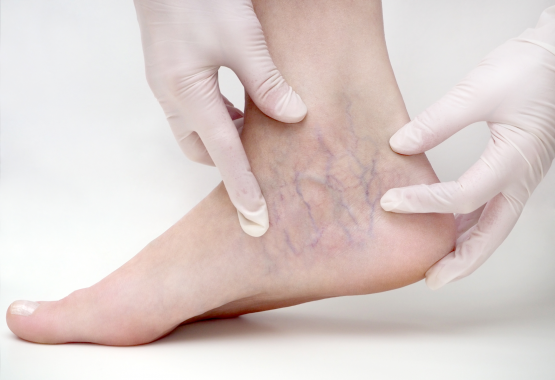
Those who might not be suitable for advanced photorejuvenation treatment using the Venus Versa include people;
Any aesthetic treatment such as anti-wrinkle injections or dermal fillers must have appropriately settled before advanced photorejuvenation treatment with the Venus Versa would be suitable. You can discuss this confidentially in consultation so that you can plan ahead.
What is the Process of Photorejuvenation with the Venus Versa?
To determine whether you are a suitable candidate for photorejuvenation treatment, you will first undergo consultation with the specialist dermatology nurse, who will take your medical history and examine the area to be treated. They will also explain all of the potential side-effects, to enable you to decide whether advanced photorejuvenation is the right treatment option for you, and you can take time to consider this – you don’t have to decide on the spot.
If it is suitable to proceed, you will need a patch test to test the suitability of your skin. This is then assessed at between 24 hours and 5 days, depending on your skin type. When you return to have the site assessed, if it is safe to do so, then the treatment can be carried out.
Prior to undergoing photorejuvenation, you’ll need to prepare, and if you are taking certain medications, or have underlying medical conditions, you will be advised of any special considerations prior to your appointment.
The area to be treated will need to be clean, so you cannot use any creams or lotions beforehand – which includes makeup, so you may want to keep that in mind when planning your day. You’ll need to remove any jewellery near the area.
You will be asked to lie down comfortably on a couch, and the expertly trained practitioner will pass the device over the area to be treated. Photorejuvenation with the Venus Versa may feel like a light elastic snap on the surface of the skin, but the treatment is not usually considered painful, and doesn’t normally require any anaesthetic beforehand. Some areas might be more sensitive than others – for example, the upper lip – so if it is a little intense during your first treatment, you can let the practitioner know, and they can adjust the intensity in order to make you more comfortable during the process.
You can leave the clinic straight away afterwards, and you will be given follow-up care instructions on what to expect and what to avoid after your treatment, and it is important to follow these instructions to the letter.
The results of advanced photorejuvenation treatment are cumulative, and thus require multiple sessions, typically 4-5 treatments spaced 3-4 weeks apart on a single area, and the effects can be subtle initially, but patients undergoing subsequent sessions are likely to see the results more quickly. Once the desired effect has been reached, it does not permanently counteract the ageing process, so maintenance treatments would need to be carried out, usually 3-6 months later, depending on how your skin responds to treatment.
What are the Risks and Complications of Photorejuvenation with the Venus Versa?
If the patient meets all criteria to have advanced photorejuvenation treatment, it is quite safe and effective in properly trained hands, but it is possible to have complications, and in most cases they would be minor – such as;
If complications occur, follow your aftercare instructions, and the clinic will be able to recommend a prescription antibiotic cream if necessary. Never use any treatment other than what the dermatologist has advised if you have complications.
If you have underlying medical conditions, or are regularly taking medications, it is essential that you let your dermatologist know when they take your medical history during consultation.
What is the Recovery Time and Outcome of Photorejuvenation with the Venus Versa?
If you are suitable for photorejuvenation treatment with the Venus Versa, and it is the right option for you, the procedure usually takes about -30 minutes and any redness usually disappears within 24 hours.
During this time, you will want to ensure you are following the appropriate follow-up care instructions. While you’ll need to be staying well away from exposure to UV rays (whether sunlight or other sources) for up to 4 weeks depending on your skin type, once you have been told it is appropriate to use a lotion on the skin, make sure you are using an SPF of at least factor 30 (but ideally factor 50) in the area that’s been treated.
You should also avoid hot baths, rigorous exercise, massages or any treatment that requires direct contact with the skin for at least 48 hours after treatment.
The full effects of the treatment are visible after multiple sessions.
Whatever your needs, you can rest assured that Derma will provide the very best care for your skin, with access to the latest research and treatments.
Before and After
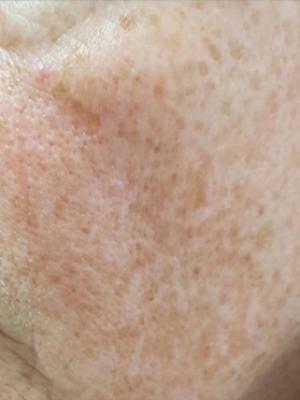
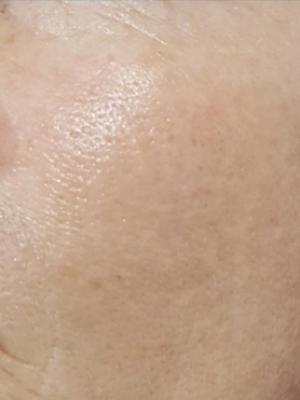
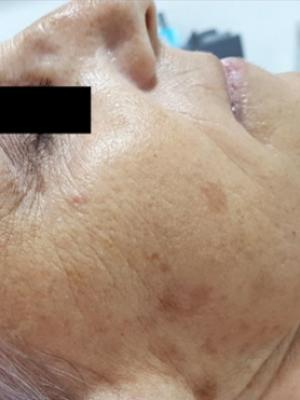
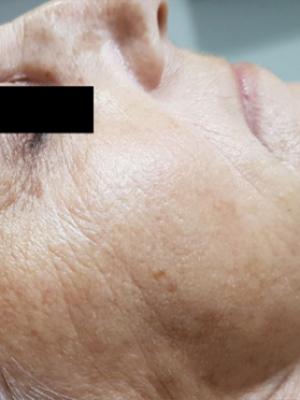
Send an Enquiry